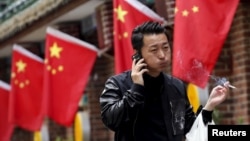China enforced sweeping new rules on Tuesday to restrict tobacco advertisements, in its latest step to rein in a widespread habit that has caused a massive health crisis.
More than 300 million people have made cigarettes part of the social fabric in the world's biggest producer and consumer of tobacco, and another 740 million are exposed to second-hand smoke, state media have reported.
Revisions to the national advertisement law, passed in April, ban tobacco advertisements in mass media, public places, on public vehicles and outdoors.
Anti-smoking advocates praised the changes, but warned that some parts of the law could be abused by the country's powerful tobacco monopoly, which they say has pushed back against a series of ambitious anti-smoking measures.
"They can't stop it, but they can create a headache," said Bernhard Schwartlander, the World Health Organization's representative in China, referring to the country's anti-smoking campaign.
"The problem is the language that has been chosen, the interpretation of those words sometimes opens room for discussion, which the tobacco industry will try to use," he added.
Lobbying to ease restrictions
China's powerful State Tobacco Monopoly Administration, until February run by the younger brother of Premier Li Keqiang, had lobbied intensely to water down proposed restrictions on advertising, sources told Reuters last year.
The state tobacco monopoly, which controls the bulk of the domestic market, wields extraordinary power because it provides an estimated 7 percent to 10 percent of government revenue, or as much as 816 billion yuan ($127 billion) in 2013.
But many big cities, including Beijing, already have tougher curbs on smoking than rural areas, and billboards promoting cigarettes are seldom seen in the capital.
The revised advertising law also includes harsher punishments for false advertising, prohibits advertising in schools or on educational materials, and bars endorsements of products by children younger than 10.
Health officials and anti-smoking campaigners said the changes particularly targeted smoking among the young.
In an interview, Liang Xiaofeng, deputy director of China's Center for Disease Control and Prevention, said he expected the government to further increase tobacco taxes because teenage smokers are more price-sensitive.
"We believe that hiking prices will impact minors in large part because they don't have their own income," he added.





